We sneak-peeked the new website and it's gorgeous! And brilliantly presents Water on Demand's game-changing model for funding clean water… Which after all, is what our mission is really all about, clean water for all people — Water4Us™. But how will our strategy stand up against volatile markets and today's alarming geopolitical developments? Find out in the replay!
Transcript from recording
Opening
News Show Host: OriginClear is a company that focuses on wastewater treatment.
CEO OriginClear — Riggs: And hello everyone. Welcome to the Water is the New Gold CEO briefing.
Riggs: Our mission is to transform the water industry.
OriginClear Chief Engineer: Decentralization offers us this opportunity.
CEO Manhattan Street Capital: The plan that you've built here is super impressive.
Investor: The world is experiencing a crisis in regards to water. It's a great opportunity that you're giving us investors.
Riggs: Decentralization of water treatment means that we no longer need to establish giant water treatment plants.
OriginClear VP Development: Let them fight over the 20%. Let's work with the 80% that's untreated.
Investment Advisor: Over 21 thousand unique alternative investments.
Riggs: Three million jobs in the US alone.
Investor: Making it easy for the regular investor.
Riggs: All the old trends just accelerated.
Investor: It's lucrative and fulfilling.
OriginClear Chief Engineer: The vision I've got is to standardize these products. Design, Build, Own and Operate.
Riggs: We have 65 people in the room.
CEO AGM Agency: We've got an important message to give to the world.
CEO PhilanthroInvestors: We can put a guy on the moon but our water is horrible.
Pool Cleaning Technician: Recycling all that water, it's a huge impact for the environment.
COO OriginClear: Bringing new infrastructure in drives the growth in America.
Riggs: That's a critical part of the picture.
Progressive Water Engineer: It's a twin 125 gallon per minute RO (reverse osmosis) system.
Riggs: I don't think we're talking about a 10 Million dollar fund, we're talking about a series of 10 million dollar funds.
Overseas Partner: The opportunity itself is very big.
International Investor: You want to live? Take care of the water.
Investor: Not too many CEOs do a weekly briefing and are willing to talk to individual investors.
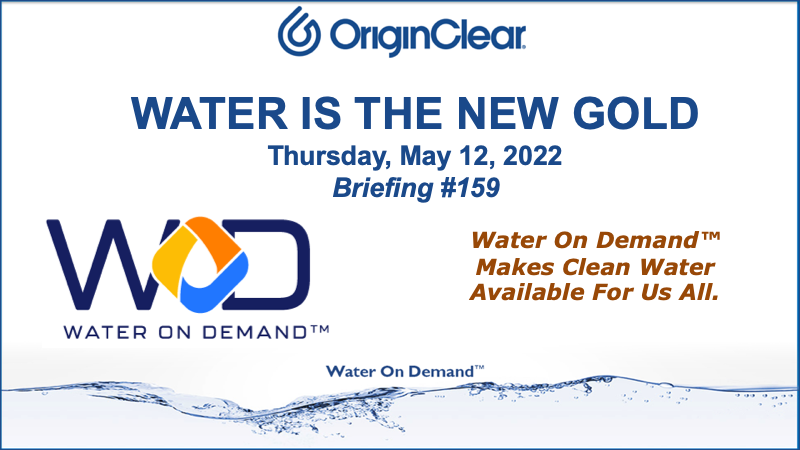
Introduction
Riggs Eckelberry:
And here we are. How is everyone? It's nice to see people showing up right now. And I have an action packed briefing for you. 159th briefing Water is the New Gold. And we've got this great Water on Demand thing. I've got lots of great things to talk to you about with respect to geopolitical developments and how we are directly helping with, helping people with what is dramatically impacting them. This is a tough time for many, people are adapting and we are helping them adapt too. All right.
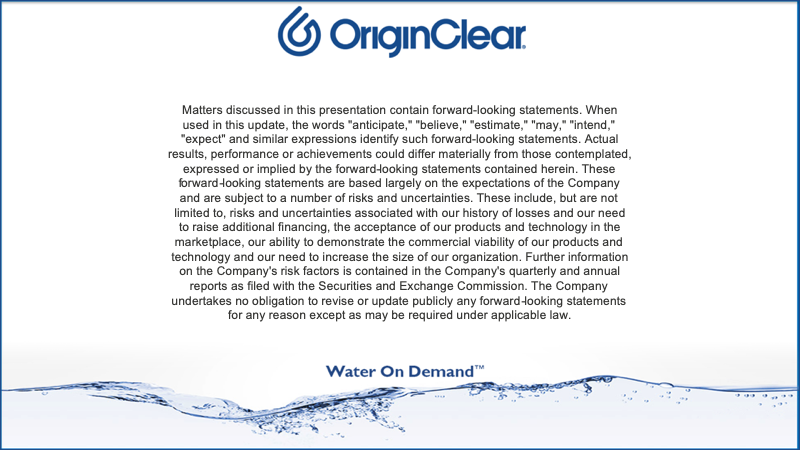
So of course, we always try very best to get it right and to tell you as much as we can legally. And when it's incorrect, we, of course, correct it.
Website Sneak Peek
All right. I wanted to give you a quick sneak peek to the new website. This is super cool. And I see that we have Ken with a happy birthday. Coming up, the main man himself. Let's take a look right now.
.png?width=800&name=WOD%20WLAOW%20(1).png)
All right. So here is you can see along the top here, this is the Adobe System here with the top line here. So what this is, is a prototyping environment. And so the home page is this one invest in water like an oil well.
.png?width=800&name=WOD%20Largest%20commodity%20(1).png)
And then we go down to largest commodity on the planet. And then it continues.
.png?width=800&name=WOD%20Step%201%20(1).png)
Step one Building the fund.
.png?width=800&name=WOD%20Step%202%20(1).png)
Step two backed by trusted technology, of course.
.png?width=800&name=WOD%20Step%203%20(1).png)
Step three Wealth creation and continued revenue.
.png?width=800&name=WOD%20Step%204%20(1).png)
How is transforming the water industry in the world?
.png?width=800&name=WOD%20SB%20Riggs%20(1).png)
This picture is supposed to be a picture of me. I know he's prettier than me, I'm sure, but. And he has hair. It's supposed to be me.
.png?width=800&name=WOD%20Exec%20Team%20(1).png)
And then, of course, we have the team. So that's.
.png?width=800&name=WOD%20Infrastructure%20crisis%20(1).png)
And then moving on to the infrastructure and crisis. Some of the stats involved.
.png?width=800&name=WOD%20Luxury%20hotel%20(1).png)
The hotel chain case study that we're building here.
.png?width=800&name=WOD%20FAQs%20(1).png)
And then we have FAQ's, which have already been written.
.png?width=800&name=WOD%20Synopsis%20(1).png)
Synopsis and of course, the footer.
.png?width=800&name=WOD%20Footer%20(1).png)
All right. And then we have what is the impact is what we just saw.
.png?width=800&name=WOD%20Investing%20(1).png)
How to invest in water like an oil well. Of course we have a picture of an oil well. Right?
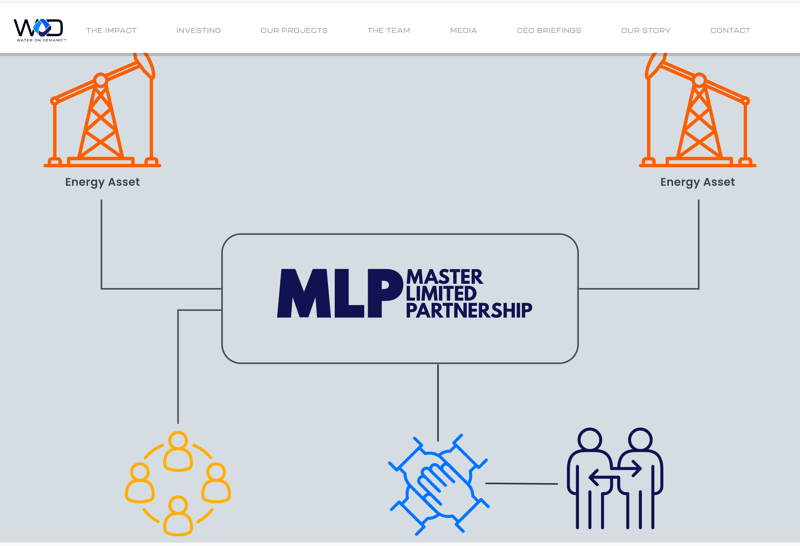
Master limited partnerships. Here we have how the traditional MLPs works.
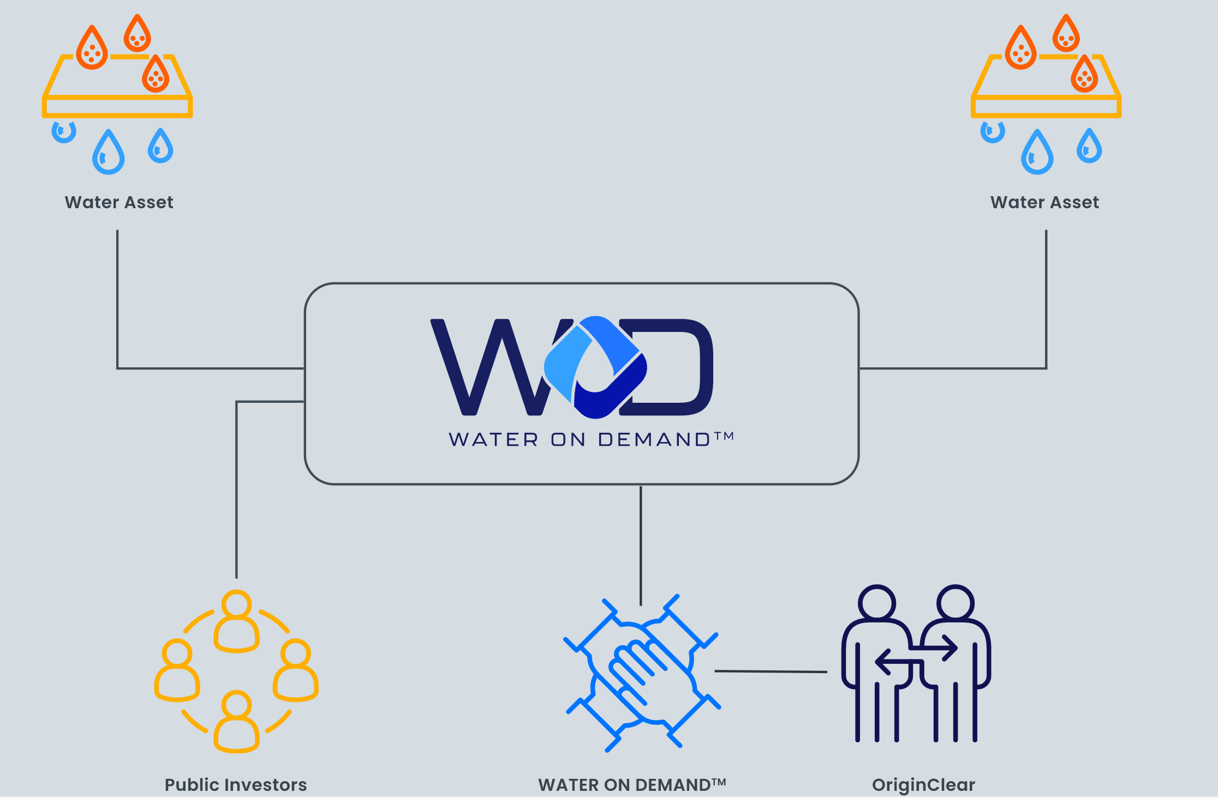
And then how the Water on Demand thing works. Isn't that cool? Traditional. Water on Demand. Super cool.
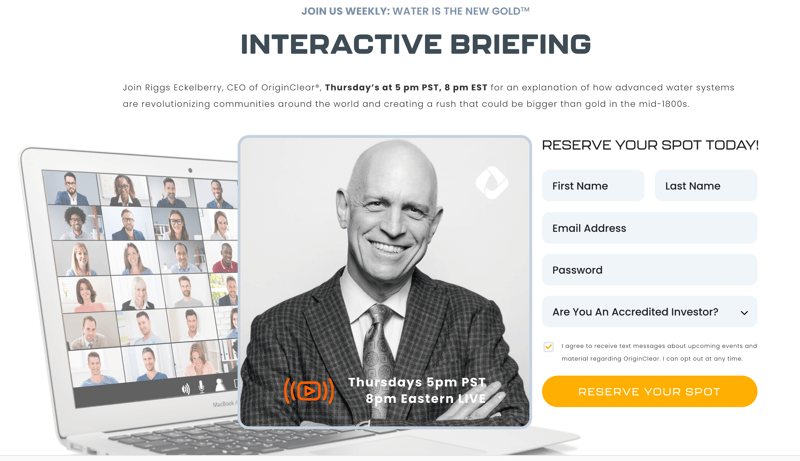
And then we have our projects. So OriginClear, this is the one, of course, we saw already the team, the of course, the media and the CEO briefings here.
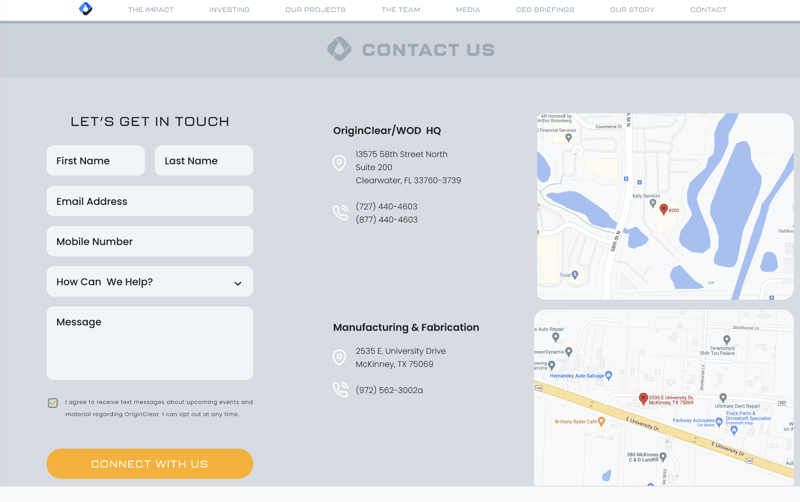
What is our story? And of course contacting us. Of course, it's got a lot of building to do, but it's a really good looking website. Looks fantastic and I love what the team has done. So that's our marketing agency, Monarchy, with the Internal Personnel Andrea d'Agostini and Josh Summers doing the management really, really proud of them. So that's that part. So you'll be seeing that develop.
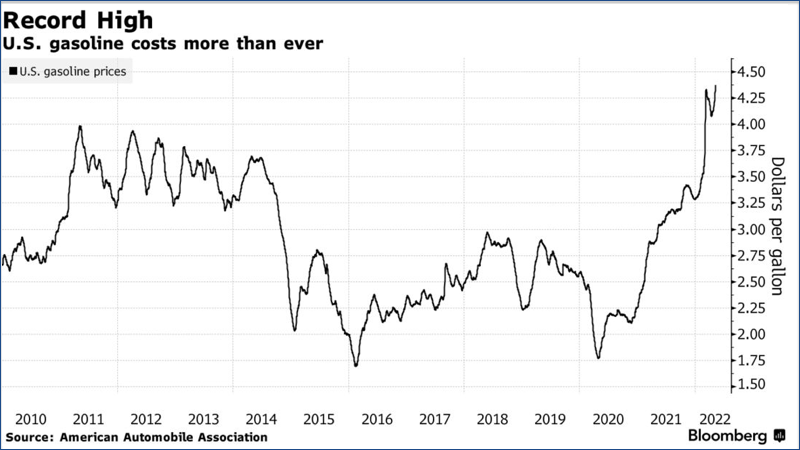
What is Driving Self-Sufficiency
Now world economic trends. What is driving self-sufficiency? Because that is you what we're talking about here. First of all, obviously, you know, you know what you're paying for gas. It is taking off and it is showing no sign of stopping.
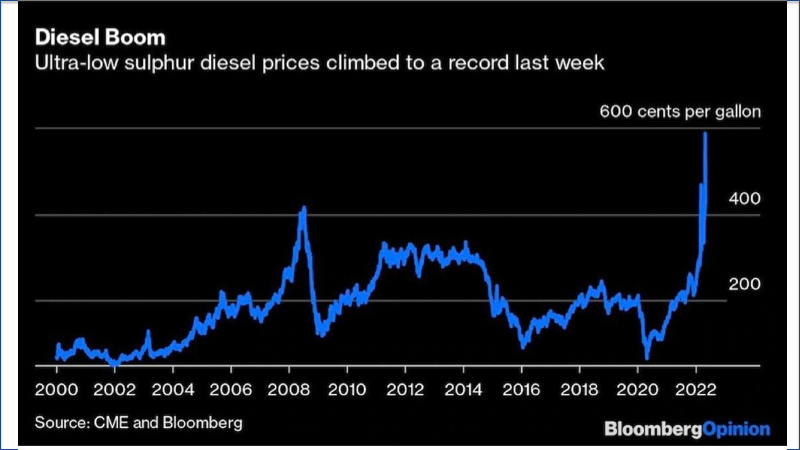
Knock Effects
Worse is diesel. Why? Because that impacts trucking. Now we're up to $6 a gallon and it just keeps on going. So this this has all kinds of what they call knock on effects in industry because of the need for diesel and transportation.
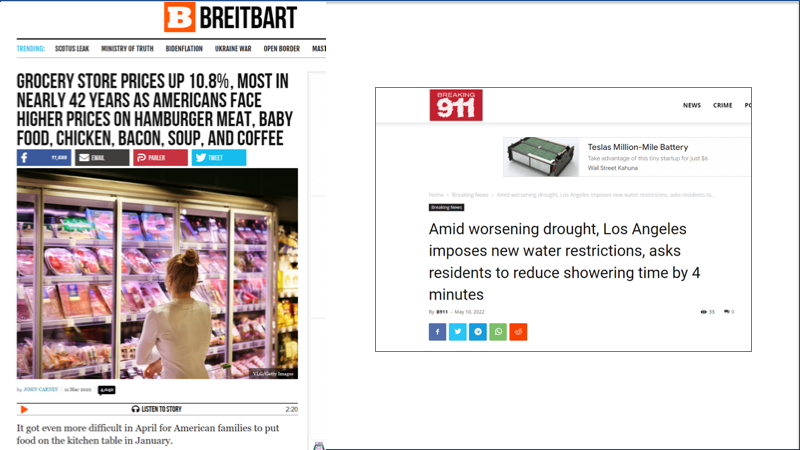
Water Restrictions
Of course, you know that grocery store prices are up most higher, highest in 42 years, along with it is droughts and water restrictions because the centralized systems are not designed for proper recycling on site, etc.. They're trying hard. Los Angeles is among the most efficient cities in America, probably the most efficient city in America, but they're still stuck with a non recycling water system. And Keith says, "Last night the news said that 3.2 billion people will face water scarcity this year, and that California will limit people to seven gallons of water a day. This is serious!" You're absolutely right, Keith. All right. And so we continue here.
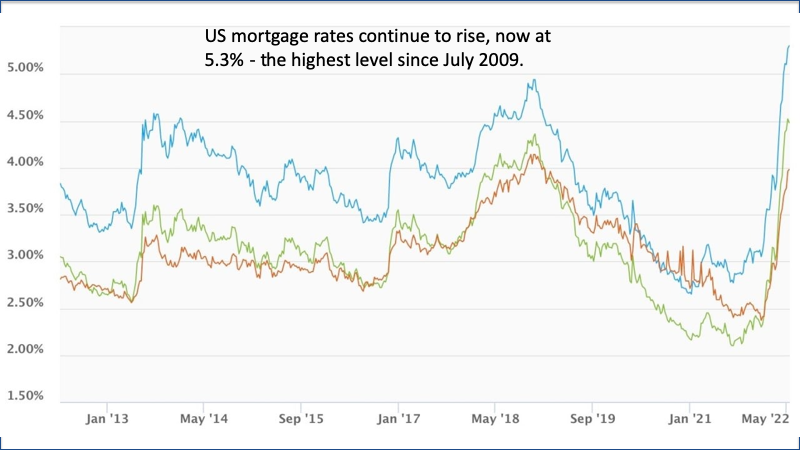
Mortgage Rates
Look at the mortgage rates. They are just taking off and they are not tapering up. So we're at 5.3% highest since July 2009 when we were coming out of the recession. And remember how money was super tight back then and you have to have incredible credit to borrow anything. Total overreaction to what had happened. Well, here we are again.
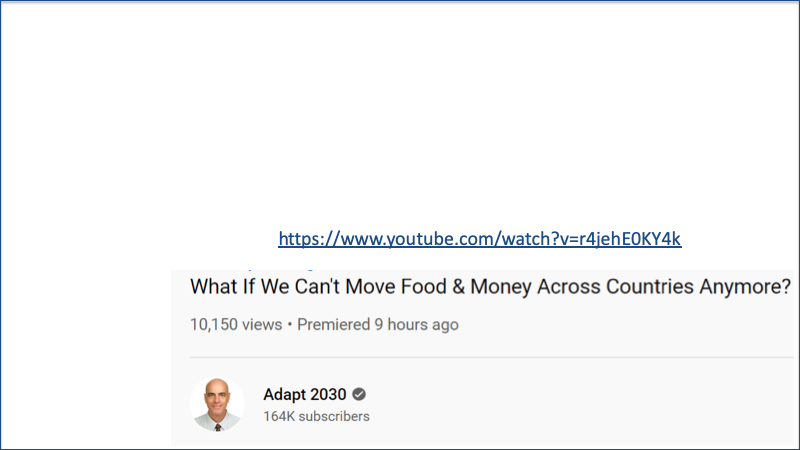
Now I'm going to go through some stats that came from a very good YouTube by Adapt 2030. And it came out today. What if we can't move food and money across countries anymore? And this is a very interesting set of slides.
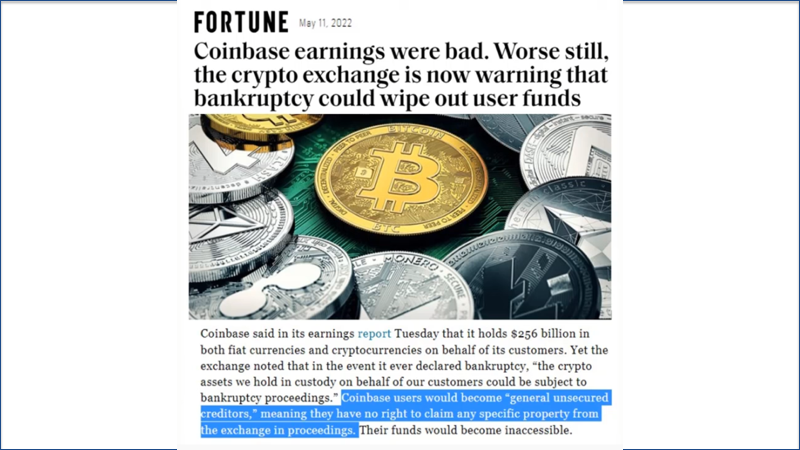
Crypto Concerns
First of all, you think that you're safe with Coinbase? Yeah, actually, you could be. What you have in a crypto exchange, you know, that can be seized for to pay off bankruptcy. So that's an issue.
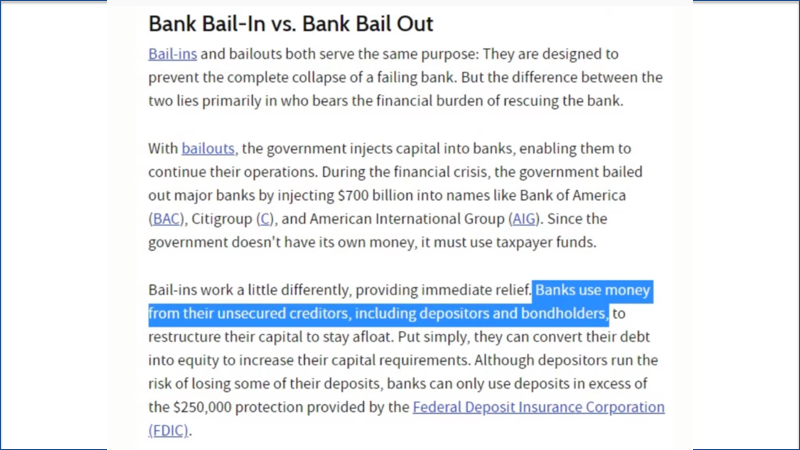
Bail Ins?
Number two is. Banks themselves use money and they also can. It's called bail ins is when they take the money from... Bailouts is the government injecting money. Bail ins is when the creditors do the restructuring, basically they take a haircut. All right. So what do we know so far that crypto is not that safe unless you go completely offline and stay out out of exchanges. Number two is banks are not safe either if they go upside down.
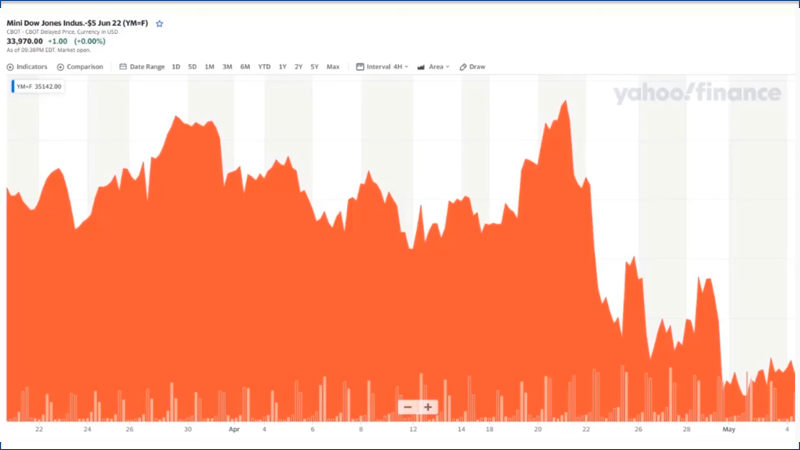
Equities I'm sorry. Now they've taken a hit. And it's I think we have a big problem with demand destruction. And so that's not over by a long shot.
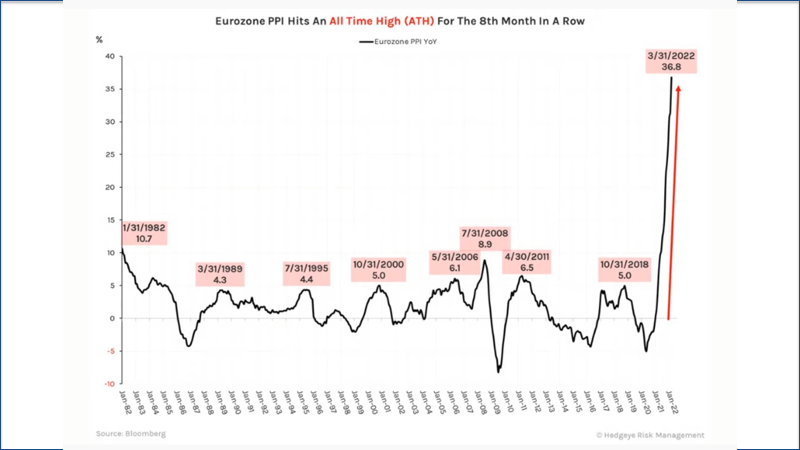
And the producer price index look at the eurozone, up ridiculously 36.8%. That's not even, they can't even compute with that. They're like what the heck, right.
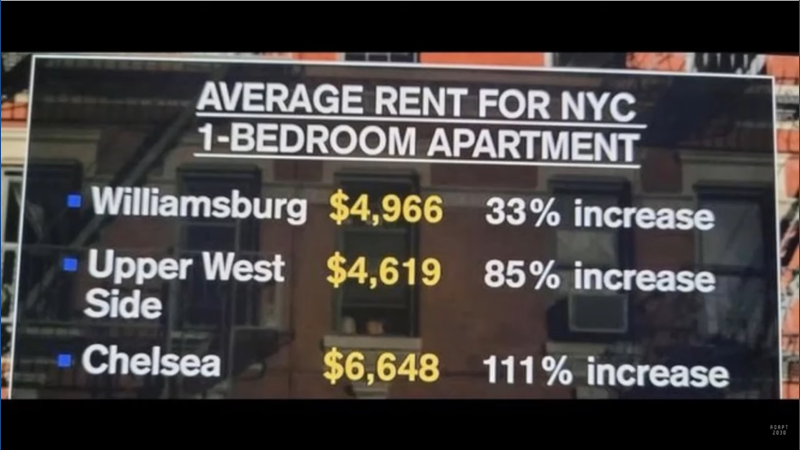
Who Could Afford It?
Now, meanwhile, average rent for New York City. One bedroom apartment is between five and $6,600. I mean, I don't know who makes that kind of money, who actually, that's well over a mortgage. Gosh, if you were buying a place just a few months ago, your mortgage was going to be in the, for $2 Million, let's say a $1 million home, three a month, but, you know, not a problem. So this is really ridiculous.

And guess what? That same amount pays for a farm and you can have your own growing of food. And this is what is happening to people. So what I'm going to do is I'm actually going to share a very good we excerpted this because it's longer, it's fairly long, but it's really good.
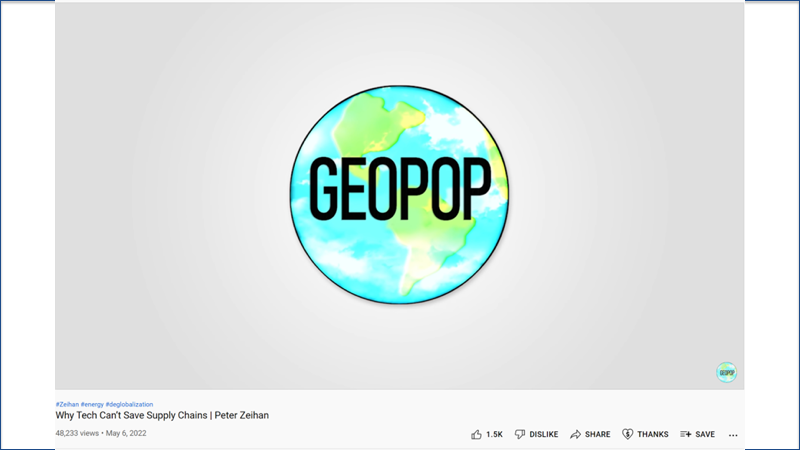
Tech and Supply Chains
Peter Zeihan is brilliant and he is in a debate with a tech financial analyst. And you'll see it's kind of a takedown. But this is the reality. And this we keep hearing about how technology is wonderful, but technology relies on underlying basic things in place. Let's let's see here what Peter Zeihan has to say.
Start of presentation
Peter Z: We understand oil. We know we have to deal with Iraq and Iran and Venezuela and Russia. It's a supply chain that's awkward and painful sometimes, but we understand it. If you want to move to EV, you have to replace the oil supply chain system with 13 more and we have to deal with 60 countries instead of five. And if we lose access to any of them, the whole thing collapses. Right now, Hong Kong, Shenzhen and Shanghai are offline. We don't know when they're going to come back. And this is the new normal for China because they don't have a vaccine. So anyone who hasn't already moved their manufacturing is just absolutely getting beaten about the head and shoulders. Right now, that transition is happening right now.
There have only been three technological revolutions in human history that have actually changed the relationship of a society to its economy and a society to its geographic positioning, sedentary agriculture, deepwater navigation and the industrial revolution. The digital revolution is real. It is changing many things about how we live and how we earn income. But it is dependent upon the industrial revolution. It is not a fundamental quantum leap beyond it. So if you break down the energy system of oil and electricity, there's nothing in the digital space that works. And I would argue that we're going to see a great deal of deindustrialization around the world in the next 20 years.
Analyst: Help me understand what you mean by deindustrialization. You mean people are going to stop making things?
Peter Z: Sure, we're in the early stages of seeing this in Ukraine, which is kind of unfair considering there's a war going on. But Ukraine gets all of its energy from Russia. And we're going to see 4 to 5 million barrels a day of Russian crude go offline later this year, which means there is not enough for global consumption to consider continue in its current form. Even if I believed in EVs hugely, the technology isn't far enough along for it to be applied to the poorer locations of the world.
So places that depend upon international trade to get the building blocks of modern society. Oil, natural gas, copper, iron ore and so on. We're entering a period of abject shortage as global trade links break down. So there are huge portions of the world. The country I am bar none most concerned about is China that simply aren't going to have access to the materials that they need to continue in a modern, industrialized lifestyle.
And if you start to industrialize, cities are a death trap. And so you're going to see the cities in these areas to a degree, empty so that people can go back to at least somewhere where they can eat.
Analyst: But why?
Peter Z: Think about why we've been able to do what we've done for the last 75 years. We've had a change in the macro strategic environment, and that's allowed access from labor or energy or finance or tech from anywhere in the world to go anywhere else. The whole world has been a single system and the economies of scale have been massive. That's now breaking down.
But you guys are familiar with what went down in the digital space and the Twitter revolution in Egypt. Very short version. The Mubarak dynasty were a bunch of assholes. And so when the people rose up against it, the military stood back and made sure that all the digital avenues were open and it resulted in the Mubarak fall. Two years later, the military was like, We don't like what's replaced it. So they cut the cables linking Egypt to the rest of the world. There were only two and they controlled the information space and they were able to take over very easily.
About a year after that, the Russians came to Egypt to find out how it was done. So then the Russians went and put digital kill switches on the four cables that go in and out of Russia. That's one of the reasons the information space in Russia is so tight and so ridiculous. Right now.
Every authoritative, authoritative system in the world has done some equivalent like that. And so the degree to which you can have honest, direct, open, globalized, if you will, connections is a much smaller part of the world than you might think. And it is dependent upon governments feeling secure enough and cultures being secure enough in their identity to not limit the digital connections between them and everyone else.
End of presentation
Transition to Smaller Communities
Riggs: That was a quick look at what is going on. So you have the assumptions of modern life and how this high tech stuff, including this very zoom that we are on, rely on layers and layers and layers of supply. But many, many people are just literally hours away from their fridge, just running out of power, and so forth. So, you know, and a lot of people are aware that they have to do something about it. And this you know, it started with COVID where it drove people moving out.
And more and more people are aware that they need to move into communities that just like what my wife and I did, we moved to Florida. And we're in a community that's a very you know, we're modern. We're not a bunch of preppers. We're not, you know, salting away. We should probably have five years worth of food supplies. But at the very least, we have a community here and we have friends, friends with farms. Right. So that's kind of the new thing is, is creating a network of friends that can take care of it.
So once you go back down to this level, you go, wait a minute, what about my energy? What about my food supplies? What about my water? And that's when that gets important. So I'm going to go ahead and continue on to play the next video. This video is a excerpt from an interview that I gave. And the interviewer, who was taking notes for an article he was writing, was kind enough to share the results with me. So let's take a look.
Start of presentation
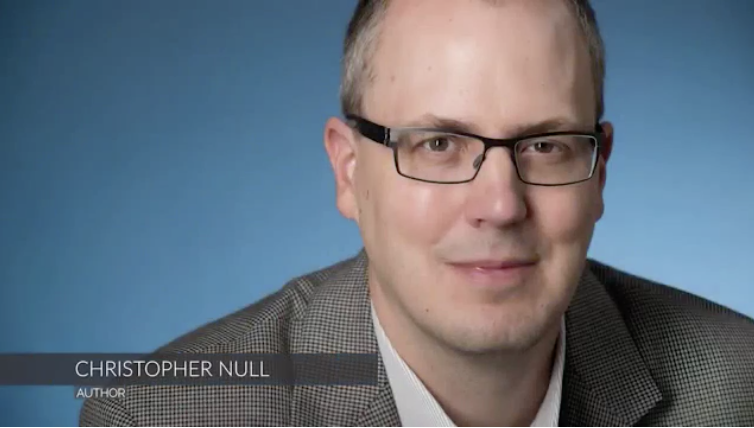
Chris N: So the piece I'm working on is about security risks to critical infrastructure. You know how bad these are getting and what's being done to protect them.
Riggs: There's been a really no more than two or three cyber intrusions in water and they've been generally caught. There has not been a lot of infrastructure, successful intrusion in water infrastructure to date. You know, they were able to catch it in a couple of the instances that it occurred. But generally what we're talking about here is the problem with with the water industry is that the old centralized model is falling apart.
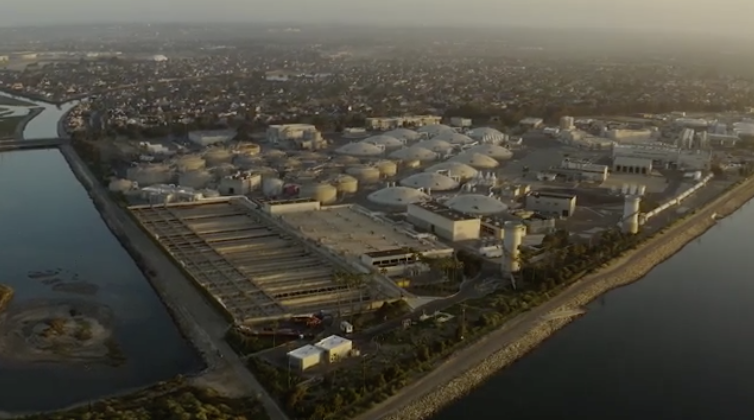
Real Issues
We have under underfunding by the federal government, which has basically gone away, rising demands on the water industry for increased standards. And we have, of course, just general expansion of businesses and populations, and it's just not being kept up with. Now, the solution is to take the load off and start doing more at the periphery. So that's what we call decentralized water treatment.
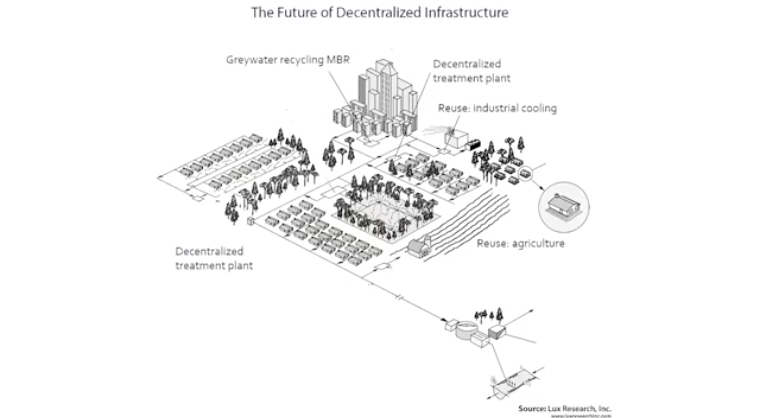
Decentralization
More and more businesses doing their own treatment, and that actually makes a more robust network when it comes to cyber defenses, because it's just like how the Internet was originally conceived by DARPA as a as a network that would not go down in the event of a nuclear exchange because each node would be independent. Now, that's, of course, no longer true with the Internet. It's it's far from that today. But that's the idea, is to create redundancy by having everyone do as much water treatment as they can. And then that, of course, takes the load off the central water treatment system, and the problem goes away. What we're seeing is a growing interest in do it yourself water treatment by businesses.
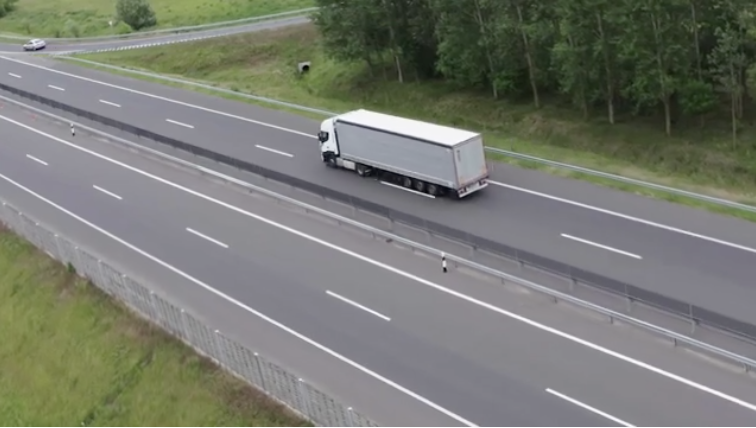
Population Migration
And then we have another major, major trend, which is populations are migrating away from the cities. The vision of quote unquote smart cities is kind of in trouble because COVID gave us an idea just how fragile things could be in a big city.
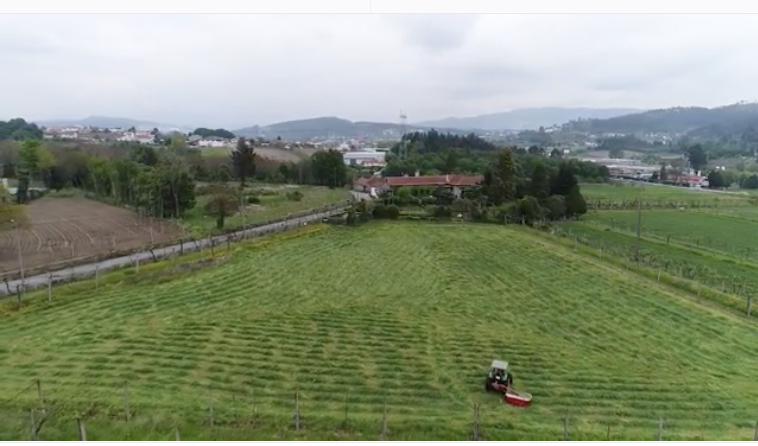
Country Life Less Affected
You know, in the country things just went on as they were in the big city. Of course, there were lockdowns and so forth. And that is also a problem when it comes to food supplies, cyber preparedness, etc.
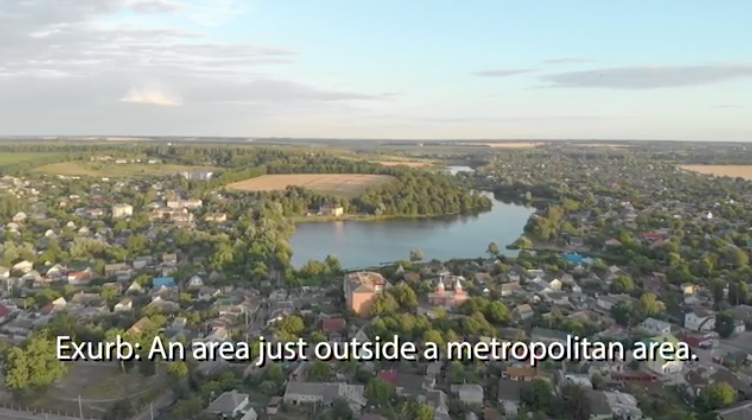
The more concentrated the population, the more you have a problem. So what you have is people are moving to the exurbs and to other states, and that's creating a need for more housing communities that are off the grid.
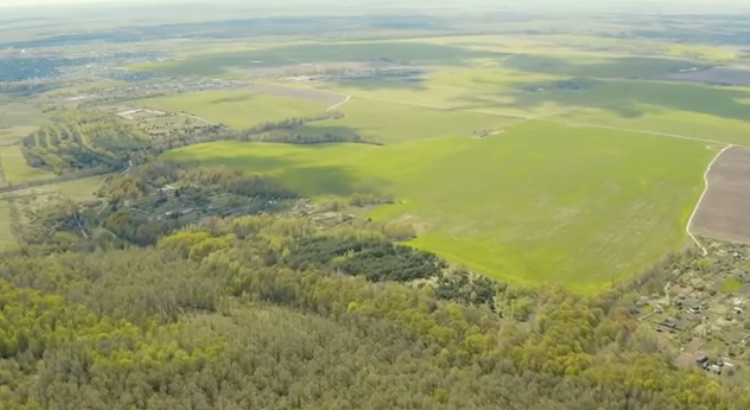
My VP just the other day bought a 50 acre plot in Pennsylvania that was quite cheap because it had no sewage access. But he knew that, because he works for us and that's what we do, it's very easy to put in your own independent autonomous water treatment, clean water supply, recycling, the whole thing, and actually save money against what the city does for you. So that is the growing direction.
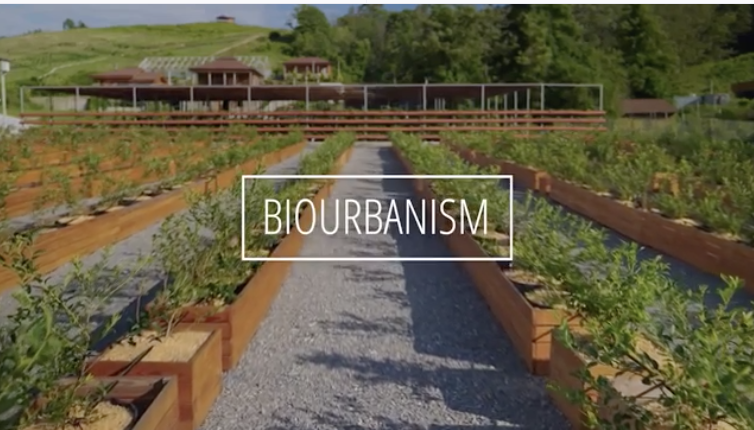
Self-Sustainability
Some people call it bio urbanism where as opposed to the smart cities concept where bio urbanism is very resilient, you know, if there's food shortages while they're making their own food, if there's shortages, they know the local farmer, they are community and they know each other. I live for years in LA without knowing who my neighbors were. That's not the case anymore. I'm in Florida here. I'm in a like minded community and that, I think is a big, big trend. And part of that is water, self sustainability.
Smaller Nodes and More Secure
Chris N: If you have multiple smaller water providers and this, you know, instead of instead of one monolithic water utility, you'll have hundreds or thousands of them?
Riggs: Well, I'm old enough to remember the great blackout, the New York blackout back in this and what was the late sixties. And because one switching station, I think it was in Canada, went down the entire Eastern Seaboard went down. So you have a monolithic water system. It's more fragile because you can take it down. But decentralized water treatment, you've got smaller nodes. Therefore, if a node goes down, so what? It's just one node versus the entire thing, number one.
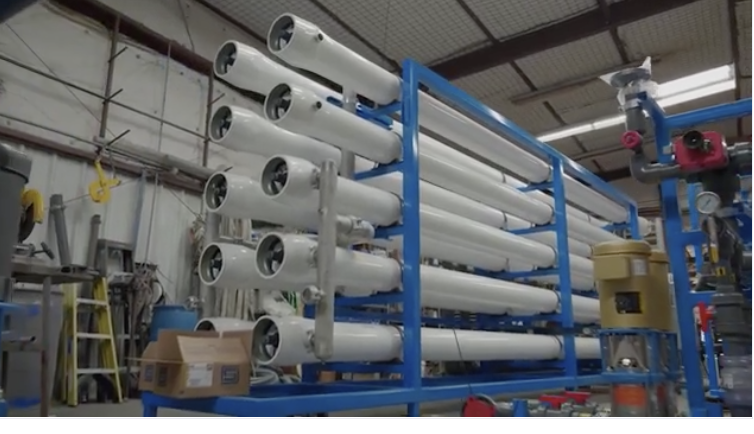
Modern Equipment
Number two, these are more modern networks. What's being built now is inherently intelligent. These have sensors and they have more robust protections. You know, it's just more modern equipment and it's built for these potential attacks. So, I'll just give you a great example. Down in Miami-Dade County, they they have a big problem with over 100,000 septic tanks in the county that were put in because there wasn't proper urban planning and people just went and put out septic tanks. And now it's creating a big problem with the aquifers.
So they're saying, well, let's spend $6 billion to replace all those septic tanks with sewage. And what's that going to do? First of all, come up with the money. Secondly, you're going to tear up. Streets and ruin quality of life for 20 years. Why not just do a rebate program for people to put in their own onsite systems? The problem gets solved 20 years earlier with 1/10 the expense. It's actually a better solution overall because you're not relying on that central system.
You know, I think the whole idea of central based systems is is really a you could almost think of it as a fifties concept. It's a, you know, big, robust central systems that do all the work. We're moving away from that. You know, I often say that, you know, California won't get a high speed train because they'll just get Google self-driving cars, you know, and because we already have freeways. So that's kind of how it is, is use the existing infrastructure, build compactly at the point of use.
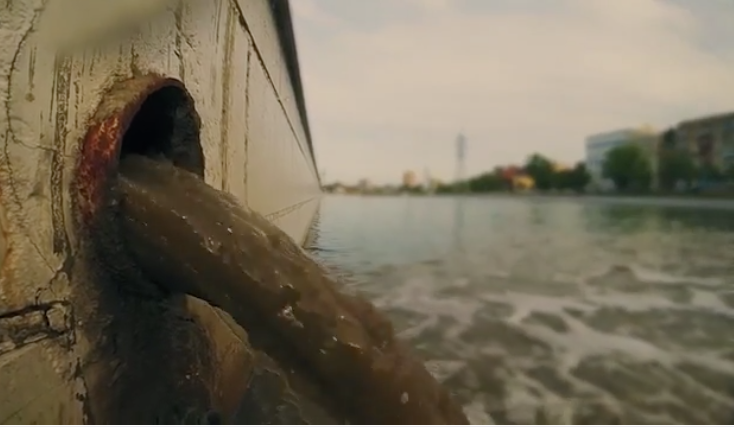
Vulnerability
Don't get into lots of transportation of the sewage, which is a point of vulnerability. I mean, think about it. Pipelines are a major problem. You get you got a sewage main break now you've got sewage everywhere. That's just as much of a problem as cutting the fresh water supply. So you have to think about any time that you are transporting clean or dirty water, you're creating a vulnerability. By doing it all on site, you're taking away that problem.
Chris N: Mm hmm. Got it. So what advice do you have for these monolithic utilities who are out there and probably aren't going to disappear any time soon, but still have to mitigate these kind of risks in the meantime?
Riggs: Well, the good news is they in general, the we have 150,000 plus water systems in America. And in general, they're delighted to see businesses and housing developments do their own work. We have a client that has a trailer park in Alabama. I don't know if you know, the trailer parks have always had a very primitive sewage treatment system consisting of dumping it in a pond. And but the the Department of Environmental Quality in Alabama was was requiring it to be upgraded.
And they said, well, let's just hook up to the city sewer system. And the city would not accept it said, no, we won't take it. It's too dirty. It's too much of a load. So the municipal treatment districts are very happy to see businesses and residential developments take care of themselves and take the problem off their off their plate.
Part of the problem, Christopher, is that people are not aware there's a problem with centralized water. They think everything's fine. And that's mostly because the industry has been saying everything's fine, don't worry, it's all good, as it would try to reassure everybody.
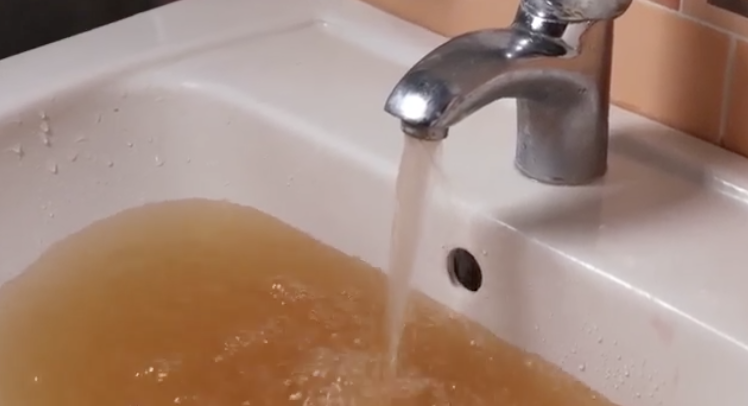
Solving Funding
But then you get with these these problems, like what happened a few years ago in Compton, California, where the water started turning and running brown And the residents said, "What's going on?" And the local water district said, "Well, we've been asking for money for the last 15 years and you wouldn't vote the funds. And so now here we are." Again, the solution is not to try and force cities and so forth to to spend a ton of money, but instead bring about more self-reliance.
So the force that is making it happen is not copy the central water systems making a lot of change happen because frankly, they're overwhelmed. It's going to be things like our own Water on Demand program where we are providing capital for business and housing development, water systems that they don't have to pay for up front. So it makes the decision very easy. And so it's kind of a revolution where people don't have to come up with all the capital to do their own treatment. They can just keep paying on the meter like they always did. And I think that's going to be the accelerator is a better financial model for the people who now have to do their own treatment.
Chris N: Great. I think I have what I need here. This has all been very helpful.
Riggs: It's a pleasure, Christopher. Thank you so much.
Chris N: Thanks, Riggs. Bye.
Detached Communities
Riggs: While this was going on. People are texting me, "Dude, mute your microphone." No, it wasn't me typing. It was the reporter taking notes as I was talking to him. And it was interesting to see what parts he thought was interesting by when he clattered. Right. That was kind of cool.
But nonetheless, this is where I started to talk. This is about a week ago where I started to talk about taking care of detached communities, this trend and so forth. As you can see, we're starting to develop this as something that's highly relevant because people are not that aware of sewage. They don't care that much, but they sure care about the water they're drinking. And that's really important for the focus.
So I'm going to now play a clip, the last clip. It's a very short kind of makes my point. This let's take a look at this one.
Start of News report
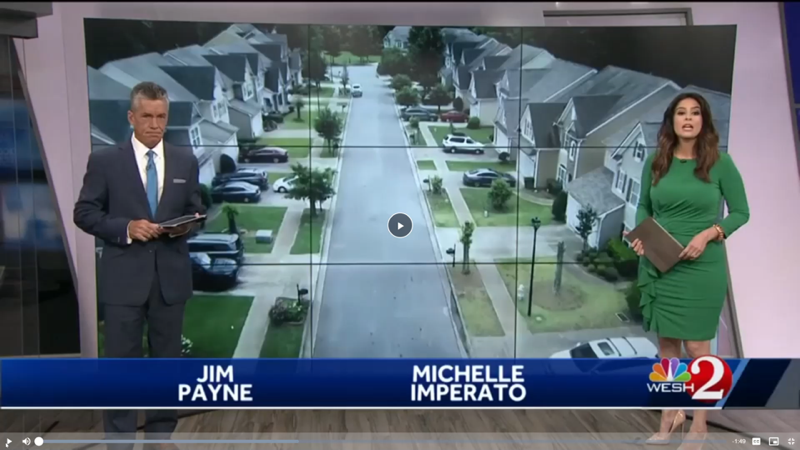
Michelle I: The housing shortage and skyrocketing real estate market in central Florida is drawing attention and money from Wall Street.
Jim P: Wesh2 Scott Heidler reports: An investment fund just bought up an entire neighborhood.
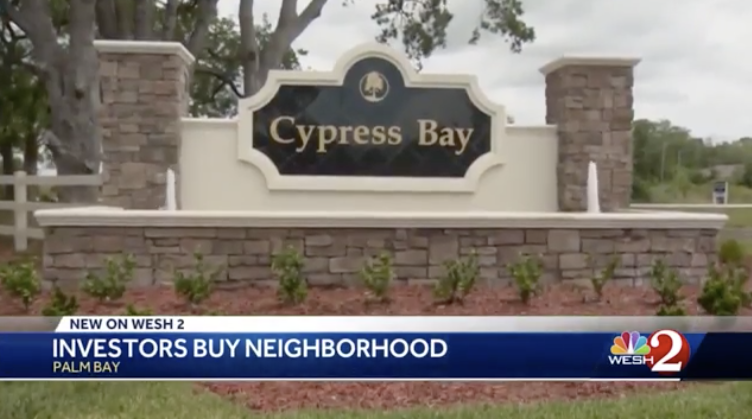
Scott H: Cypress Bay rests at the very southern edge of Brevard County. But this rental housing development, thanks to a surging market in central Florida fueled by scant available housing and a growing job market, caught the attention of the deep pockets of Wall Street.
That's a concern for a Movement of Brevard faith based organizations working for more affordable housing here.
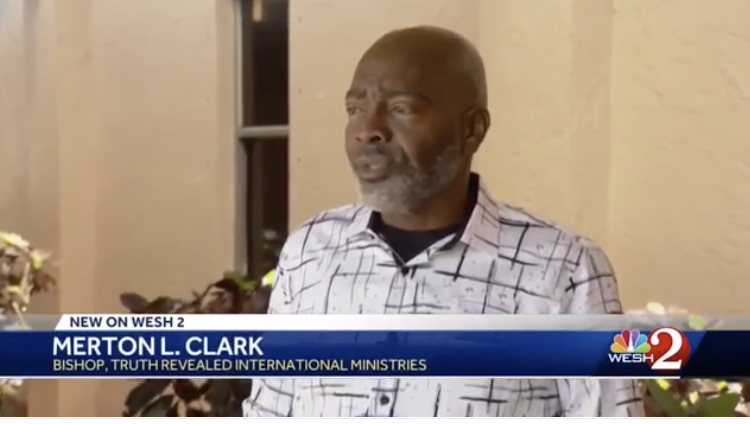
Bishop Clark: When investors come in, of course, and invest, property goes, it just goes off the, off the roof, right? And which marginalizes a whole lot of people who just can't afford. Especially those in Brevard County who are making less than $46,000 a year.
Scott H: This community here in Palm Bay of 87 homes was bought by two investment funds For $45 Million. Backed by massive New York investment bank Goldman Sachs. A relatively new move by Wall Street capitalizing on spiking rental Prices.
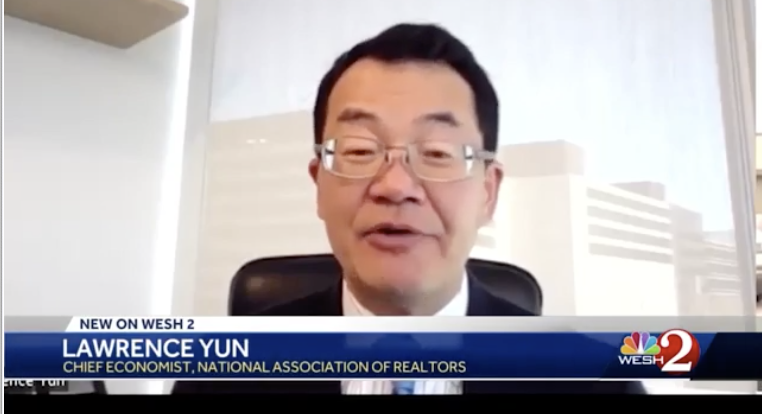
Lawrence Y: The degree of large Wall Street money coming in is fairly new, and I think this is due to the unique circumstance of housing shortage.
Scott H: That shortage is not looking to correct itself soon, so the money will probably keep flowing.
Lawrence Y: Wall Street is able to generate money. Private equity, hedge funds and others to say let's go chase the rising rents and hence money coming into rental property development.
Scott H: So what happened at Cypress Bay with the steep market demand here will no doubt happen in other nearby neighborhoods in Palm Bay. Scott Heidler, WESH2 News.
End of News report
Riggs: Fascinating huh?. So, yeah, now housing developments are being picked up in areas where people want to live. And so do you want to live in Chelsea, New York, and where it's a 6000 apartment and people are moving out. So I don't even know why the rents are so high. Or do you want to move somewhere like here, where even though it's expensive relative to what it was, it's still far less than the big city. And there's this access to the local farmer and so forth.
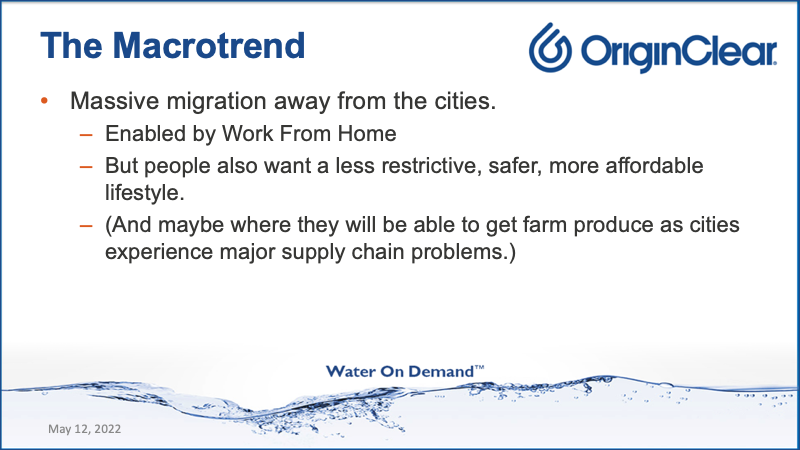
So this this is the whole calculus here. So we're done with the videos. Now, let me just quickly move through some of the recap slides. So the macro trend is massive migration away from the cities. Obviously, people can work from anywhere. They also want a less restrictive, safer and more affordable lifestyle and they can even maybe get that farm produce down the road. Right.
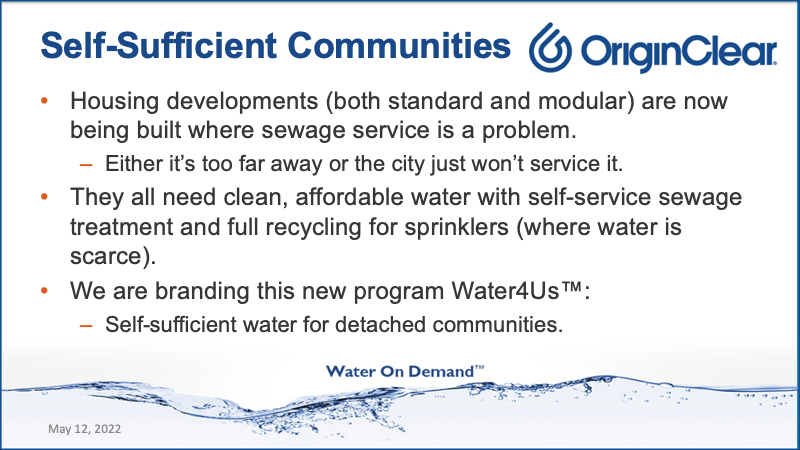
And brings us to self-sufficient communities where they're being built now, often where sewage service is a problem. And they need not only the self service, sewage treatment, but also the clean, affordable water and where appropriate, recycling. This new program we're calling Water for us self sufficient water for detached communities. That's the that's the working description.
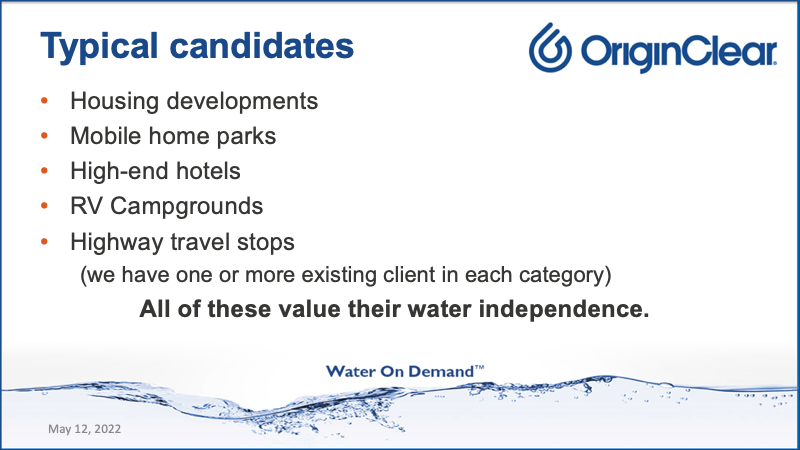
Now, we're already in this business. We already have clients that are housing developments. For example, we're building a housing development for the homeless in Texas. We have obviously mobile home parks, that trailer park that was featured in that interview, high-end hotels, you know, that we're helping to launch the incoming water treatment for a top hotel, and that is coming. The official launch, I believe, is in July. Rv campgrounds, we have several RV campgrounds and and we have a very long term relationship with a highway travel stop chain.
So we have those clients already. We already know how to build systems for them. And obviously the next step is to do the finance, which is Water on Demand they really are interested in water independence.
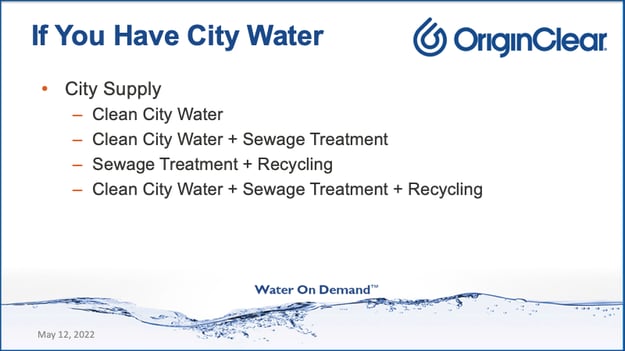
Now, if you have city water, then you have these combinations. You can clean the city water and do sewage treatment. You can just do sewage treatment, recycling, you can do all these different varieties, right?
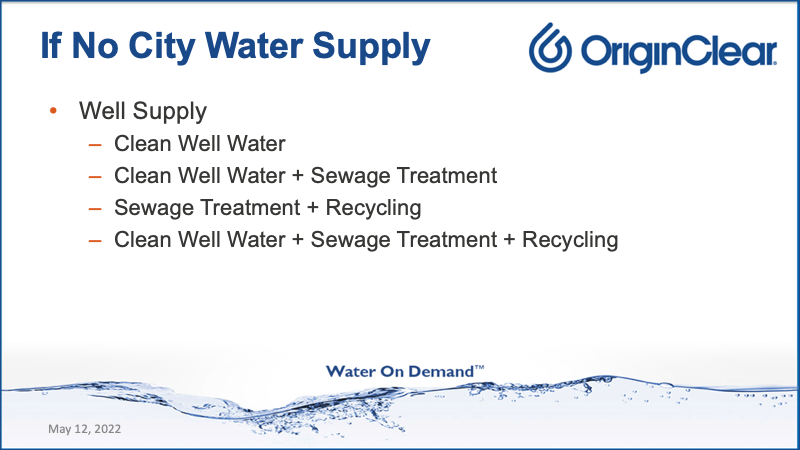
Well, supply same similar here. So these are various different a la carte type things you can do to, for your water. And obviously we are able to do all of them.
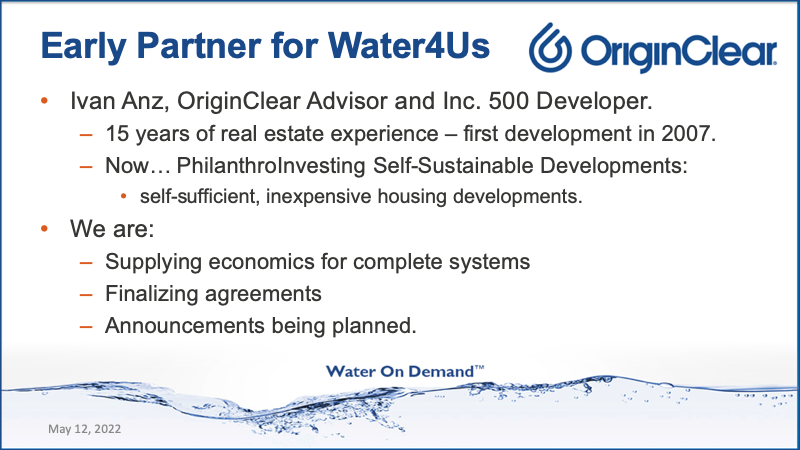
Now, I told you last week about Ivan Anz as an early partner and sure enough that is firming up. We are putting together the what's called pro formas, which is are the theoretical cost structures for supplying water to the housing development. And of course we're putting these agreements together and we're planning some announcements. So that's what we've be very, very quickly. We're very happy that Ivan is very dynamic and moves very quickly, is helping us get some traction in this new area, because we are he is completely bought into the idea of water as a service. All right.
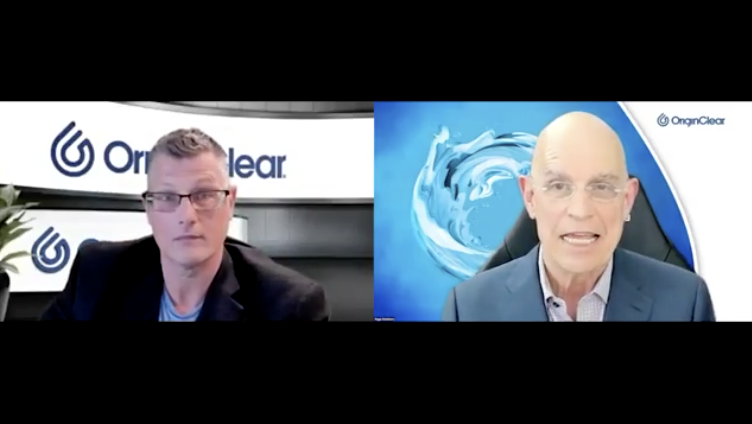
Open Discussion
So we're going to now move into the free wheeling discussion. And we were hoping to have Andrea, unfortunately, he had a dental day today. And so he's mfmfmfmf, so, dental day.
Ken: And I just had a bad hair day saying I just had a bad hair day. It's fine.
Riggs: I don't have bad hair days ever.
Ken: You don't have bad hair days, no. That's a good thing.
Riggs: So, you know, this array of stats and so forth. But the good news is that people are adaptable. People go, okay, what do I do? What do I do, what I do? And they're just like you did, just like my family did. Move to an area where we have better control over our lives. Years ago, actually, you moved out of Long Beach, New York, for. For reasons that are real.
Ken: I got washed out of Long Beach, but yeah, I left Long Island eventually. Right? So, yeah. So that's an interesting point. Right. So, yes.
Riggs: Sandy took care of you.
Ken: Right.
Riggs: But nonetheless, you went away from a fragile, vulnerable area to one where you could feel more secure.
Ken: Absolutely. And to give you an idea, when Sandy hit Long Beach, New York, where I lived, I had a second floor condo. That took water.
Riggs: Geez.
Ken: It wiped out. It wiped out every car on the on the on the island. It wiped out every every business on the island. There was no sewage. There was no lights. There was no power. There was no phones. There was. So you want to talk about that was the epitome, that and and there was nothing like you were you couldn't even leave, right? You couldn't drive. So, yeah, it was, it epitomized when you when he said that cities in times of crisis turn into death traps it, it literally was a death trap.
There were wires buzzing on the ground. I mean, it looked like, you know, it looked like there was a war and we lost. Right. That's what it looked like. As you were rolling out a Long Beach, you were just like, oh, my God.
And to another point. You know, I'm working on trying to buy this acreage now. And my goal is, to literally put a ten acre lot for myself so I can have a farm, I can have some horses and stuff like that. Right. And I'm 10 minutes from downtown. Right. Which is cool.
End to End
The other the other thing that as an extension of what Ivan has started to stimulate for us with the Water4Us™ and the, what I've referred to when I've spoken to prospective investors is, think of a total end to end from aquifer to expulsion of wastewater, a complete autonomy and control of your own water. That becomes this insatiable market appeal here, like in the exurbs. But I want to go beyond that.
The model that we're creating with Water on Demand, it's not an experiment. Solar pools are doing this right now to great effect. And where are they delivering power Riggs? It's not Southern California where there's brownouts. Where are they doing it? They're doing it in Africa. They're doing it in third world countries. Why? Because their general idea is, is that the the centralized grids will figure it out on their own someday. This is a place where there is no power.
So it's a quality of life issue. Right. They say, well, look, if we can deliver power to places in Africa, we're improving quality of life. We're using that same investor pool model to deliver what I would argue. First of all, we've got we've got we've got much more price stability than oil. We've got far greater inflation protection than real estate. Those, by the way, I did the math, $517,000 a home for that property for the Morgan Stanley that bought it, the 8040. It was $87 million. I mean, I'm sorry, $45 billion, 87 homes. It's $517,000 per property.
Riggs: And they were OK houses, I mean.
Ken: They were nice. They were nice. And you're right, you couldn't get a Chelsea apartment. They'll be able to rent those things for four grand a month. Right. And that's a 3000 mortgage. They make 45,000 a month and it's not. So that's not so bad. My point is, when inflation rises and I believe it will, they can't just go, hey, guys, you know that lease you signed for three years? We're going to we're going to adjust and. No, no, that's not going to work. Right. So they can't they can't chase the rents. Right.
So we have a much, we have, we're going to, literally the pay per gallon will work in real time against inflation at a factor depending upon what it comes out to. So we have more price stability than traditional energy. We have greater inflation protection than real estate. But we also have far better returns than these.
Investor Pools
These investor pools, these wonderful investor pools for solar, which is basically the same model we have, has been working now for years. They're delivering five or 7%, five, six, 7% to their investors and they're thrilled. You know why? They're thrilled because they're eco minded investors who want to make a little bit of money to do a whole lot of good. Well, how about making a whole lot of money to do a whole lot of good? Here's what I mean.
Not only, so the current model we have in Water on Demand; I did the quick math in my head and I might be off by a couple of numbers here, but I'm pretty close. A $250 Million fund. $100,000 invested in that fund will generate 27 million gallons of fresh water per 100,000. So when these eco funds that are trying to do well by do good, when they factor that in and then think about it, we're going to hit a point where this is going to go out from concentric circles, from US cities to us experts to us rural communities right and beyond, to the Third World.
Impact Investing
Well, what happens is when you start when you start cleaning fresh water or you start making water safe in that area of the world, what do you do? You start to undo the 6000 children that died today from bad water. Think about the impact. Not only would you know that you're going to clean 40, 27 million gallons of water, but that's how many gallons of water you're saving with your 100,000 investment. But wait until you can start to calculate. How many human lives saved? How many human lives you're saving? You want to talk about the definition of impact investing. There's no greater impact in the world than that.
Riggs: Yeah, that's true.
Ken: And that's exciting.
Riggs: No and you know...
Ken: That's what I think about at three in the morning, you know.
Riggs: No, no. I mean, it's so true because climate change is a threat, but it's not overtly killing people. Energy, centralized energy. And the move to solar is good, but it's not to save lives. This is with water, it's literally to save lives.
Ken: It's like our water here. Well, it's not going to kill you tomorrow. No one cares about it, right? Because it's not going to kill you tomorrow. Climate change will affect life or cause cause loss of life over decades. People don't think in decades, people don't, right? Until their backyard is burning they don't buy a fire extinguisher.
Riggs: Right.
Ken: So by being able to by being able to speak to the investing community, which controls trillions of dollars that want to do well by do good, adding adding, first of all, a significant increase in the type of well that they do by doing good. Right. It's significantly increasing the well part that's that's irresistible. They want to doing well.
Riggs: Are you doing good? Doing well?
Ken: You're doing well and you're doing good. Right. So but not only. I'm doing a lot of well. Or if you're from Long Island, water well,
Riggs: Water well,
Ken: Water well. But here's the thing. So we're going to have a better return for these investors who they want. They want to protect their money the same way as everyone else. But then you add a human life saving component to this thing. It will be unique. I think it's going to be unique unto its own because I think solar is great and the returns are fine. But if we can do better returns to the same crowd and say, And here's how many lives you save. Category all its own.
Riggs: No, it is the coming thing and people need to get into solid assets because look what's happened to the risk assets. So hard assets is where it's at, but you need to hard asset that is priced right. By the way, Jean Tully says he's come, he's in from Long Island, so you know that.
Ken: Gene?
Riggs: Yeah, he's from Long Island.
Ken: Oh, I'm sorry to hear that. When are you getting out? Just kidding. Just kidding.
Riggs: It's funny. No, I don't think he's there now. Oh, Chris Wirth says, "Very good comment Ken. Keep it up. Saving lives, investing by doing well, by doing good. Pitching, the dollar returns ."100%. So you make money, you save lives. What could be better? Gene is in Georgia now, so he has too escaped.
Ken: So he caught on. He caught on. All right. You got the memo. Gene good.
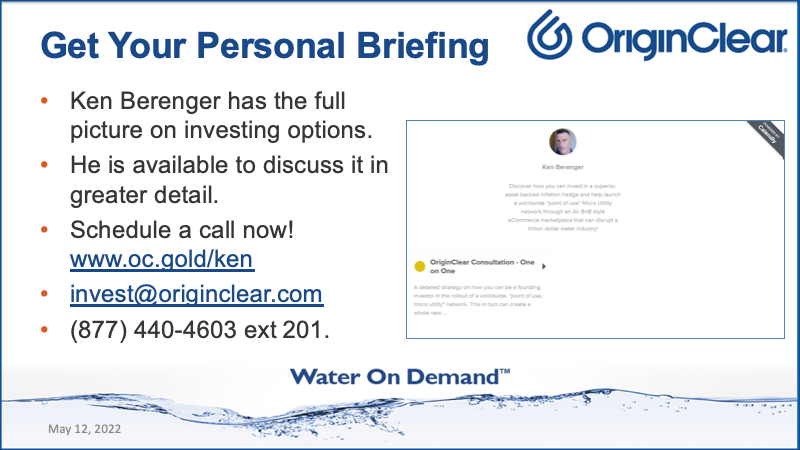
Call Ken
Riggs: So. Well, this has been a really interesting show. And by the way, I promised everyone that I was going to show the new institutional deck, and I didn't do it because I had so much to cover today. But it is coming. Remember that you can talk, you can and should talk to Ken. Just put oc.gold/ken in your browser to schedule. He is a phenomenally intelligent person and he is also constantly, you know, he doesn't sleep at night. Basically, he thinks about things like saving lives with.
Ken: Which is fine, except I don't sleep in the day either. So yeah, it's.
Riggs: We don't want you to sleep ever.
Ken: That's where it becomes a problem, right? Sleeping. Exactly. So one other thing is, I will try to, I will make a commitment to our audience that I will try to pull that institutional deck out of Riggs tonight, so I have it for our discussion. How's that?
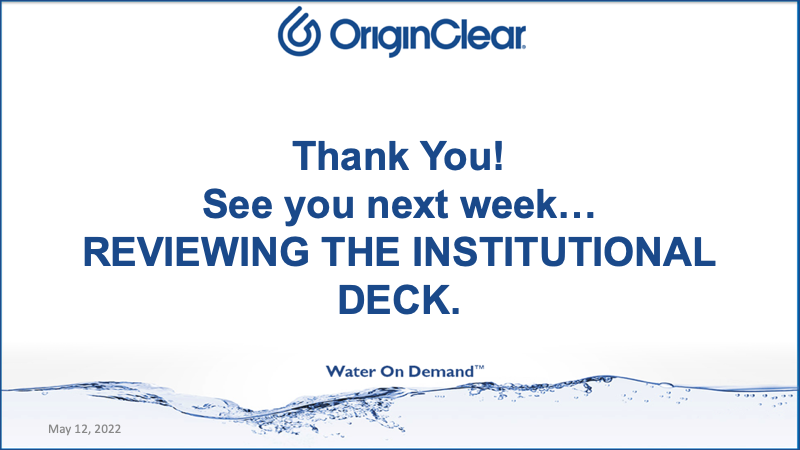
Riggs: No, it's something that we're very close to being ready with. And but I was so excited about the website that I saw last night. And then, of course, all these interesting developments, geopolitical developments. So everyone be well, stay safe, both personally and economically. This is very exciting times. Brian Hallinan wishes you a happy birthday and so on the 15th in three days have the pleasure of being harassed by all of us. Chris Werth asked us to flash the info contact info again. So here it is and we look forward to hearing from you all.
Listen, the structure of this offering is that the $20 million invested in the next $10 million, which includes what's already been invested. So it's only about 17 and a half million ago. Benefits from a locked in 10% in the Water on Demand spinoff. After that $20 million, it's over. That is the founding group and you need to get in and make your self happen. James Wright says, "Power naps rest by osmosis from those in society doing nothing."
Ken: There you go. If only I'll forget it then. Then I would be. You know, I would. I wouldn't have any gray hair. But yeah.
Riggs: Exactly. And fortunately, you don't get overheated, so therefore you didn't lose all your hair like me. That's right. All right. Anyway, that was a bad joke. Guys, thank you so much. It was a pleasure. It was so excited about how it's going when we fast as you can see, we're executing rapidly. Remember that what we're doing is real. We have this clientele that we're working on expanding into with Water4Us. We're just adding that financial layer. And you are helping us.
Ken: And the financial model has already been proven. We're simply adapting it to the largest commodity on earth.
Riggs: Boom. Drop the mic Ken. Good night, everyone. Have a great weekend.
Register for the next Insider Briefing: HERE
%20250px.png?width=250&height=53&name=OriginClear%20Logo%202019%20(RGB)%20250px.png)




